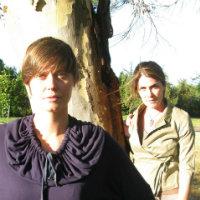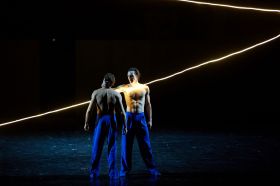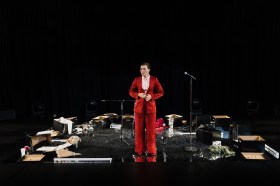Set in the bushfire-ravaged region of Victoria, death is a topic that The Fallen Tree constantly evokes. Young Hannah (Libby Gott) is suffering after the death of her mother ten months ago. Her sister, long affected by an eating disorder, is absent but nonetheless revived by Hannah as she discusses her life with neighbour Claire (Bridgette Burton). While Hannah busies herself piling up the dry limbs of a fallen tree for a burn off, it becomes clear that the lives of these two women are much more closely intertwined with that of Hannah’s stepfather (Jonathon Dyer) than they care to admit.
Director Wayne Pearn has wisely decided to hold back the melodrama. It means that this is a slow-burn play that fires up suddenly, with little forewarning, and is very effective as a result. Much like the Black Saturday bushfires, the story of The Fallen Tree is destined to leave a trail of destruction in its wake. As the lives of the trio gradually begin to wrap around each other, the play explores who really holds the power in a relationship, and whether a short, sharp descent is better or worse than a slow decline.
The cast were well-chosen, each ably reflecting their characters’ motivations and the uncomfortable reality of their psyches. Gott plays Hannah as someone gutsy but horribly vulnerable in the aftermath of her mother’s death. Having my own experience with the communities of bushfire-ravaged areas, Gott comes across as an incredibly authentic rural-born character; she is bruised and emotionally raw, and angry if she feels she has betrayed even the slightest vulnerability.
Dyer too, is deliciously calculating in his interactions with the two women. The audience watches him writhe from charming to twisted in mere seconds. Dyer’s character certainly draws the eye in every scene he’s in, simply because the audience is aware he is someone that cannot be trusted.
Burton plays Claire as a woman who is self-aware and mostly in-control, but overwhelmed by loneliness and fear. She doesn’t overdo a role that is somewhat susceptible to melodrama; she saves raising her voice for moments that do require an injection of force, allowing the moments where she crumbles to be magnified by difference. It makes her interactions with Dyer all the more interesting, as she doesn’t appear to be a woman who is often easily fooled.
The Fallen Tree is an unexpectedly nuanced play for something that only runs for 70 minutes. There’s plenty for audience members to infer, and even if you don’t get time to grasp it all, you’re left with the pleasant sense that writer Christine Croyden enjoys twisting the knife sharply and suddenly, forcing the audience to question whether it is even possible to truly know someone until you’ve seen the journey they have taken.
Rating: 4 stars out of 5
The Fallen Tree
Written by Christine Croyden
Directed by Wayne Pearn
Performed by Libby Gott, Bridgette Burton and Jonathon Dyer
Design by Alice Bishop
Lighting Design by Lindon Blakely
Stage Manager: Julie-Anne Donnellan
La Mama Theatre
February 15 – March 4






